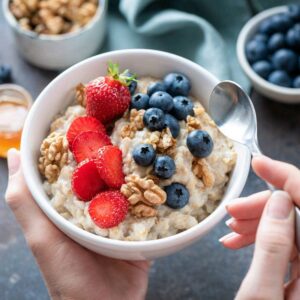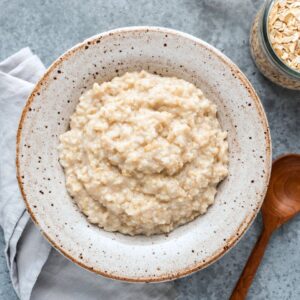
I decided to consume the equivalent of around one cup of oats eaten in whatever healthy form I felt like every day for the 14-day period. First, I focused on breakfast….CONTINUE FULL READING>>>>>
I started the first day with my normal plain oatmeal bowl, then moved on to two mornings of oatmeal with fruit – banana one day and apples and cinnamon the next. I stirred pure maple syrup into plain oatmeal for day 4, before switching to cold overnight oats for two days. I finished off the first week with a healthy oatmeal bar snack between lunch and dinner.
Before I started this challenge, I knew that digestive issues like bloating can be a problem when you increase your fiber intake so this is why I started with the plain oatmeal and branched out to other types of oats that my body wouldn’t have been as familiar with. On week two, I went for more variety. I really like chia/oat pudding, and ate it four times — a coffee blend, an apple blend, a vanilla blend and a blueberry blend. The fifth day of this week called for a low-fat oat bran muffin snack, and I finished up the two weeks with two days of oat bran cereal.
The main effect I noticed once I got into the oatmeal groove was, indeed, more energy. After three days of oatmeal breakfasts, I went on my regular 4-mile walk and found I was moving faster with less effort.
I then took on a very physical few days — lots of walking, shopping, lifting heavy items into the car trunk — and was happy to see that I definitely had more stamina than usual doing these things. On the sixth day, I did another 4-mile walk and cut 15 minutes off my time without even trying. A shorter 2-mile walk later in the week was also faster, and I wasn’t at all tired afterward. It was amazing and motivating to see proof that the complex carbohydrates in oats did help me power through more than my normal (and healthy!) yogurt breakfast.

I’m lucky not to have any major health issues, so I can’t say that eating oatmeal changed anything about my digestion or lowered my blood pressure. (I did do a quick at-home BP measurement, which was normal — but again, I don’t have hypertension or cardiac problems.)
I did clock a very distinct feeling of fullness between breakfast and lunch, though. I eat breakfast early — around 5:30am — but I didn’t feel hungry until my lunchtime rolled around at 11:30am. Six hours of satiety is a pretty good deal! I already knew oatmeal is filling for me, but I was happily surprised at how long it kept me full! Maybe that great satiety I experienced is because oats are a good source of protein, too — almost as much as a cup of yogurt, depending on what kind you eat.
What are the potential benefits of eating oats?
Oats can be important tools when it comes to preventing diabetes, cardiac issues and GI problems. “Oats are an excellent source of beta-glucan, a soluble fiber shown to help manage blood sugar, reduce blood cholesterol levels and support heart health,” says Marisa Moore, M.B.A., R.D.N., L.D., a nutritionist in Atlanta.
Let’s take a closer look at four ways oats can positively help your health:
1. Oats may help protect your cardiovascular system. In one recent animal study, Canadian researchers found that the consumption of oats protects systolic heart function and lowered cholesterol. A second study they did in animals showed that oats lowers blood pressure and prevents cardiac dysfunction. The researchers believe that oat protein is the element that drives these positive effects.
2. Oatmeal helps you stay regular. The soluble fiber in oatmeal keeps water in your stool. This means your bowel movements are bigger and softer, which makes them easier to pass. Research suggests that fiber also helps you avoid constipation. The key is to drink lots of water to help the fiber do its job.
3. Oatmeal supports a healthy gut. Your gut microbiome is essential for helping with good digestion, and it may play a role in other health conditions as well. Research shows the beta-glucan, a soluble fiber found in oats, resists digestion in the small intestine and reaches your large intestine, where it can feed and benefit your gut microbiome.
4. Oatmeal can help you manage your weight. If you’re watching your weight, the beta-glucan in oats may help you feel full for longer periods, according to research.
Oats nutrition
One cup of rolled oats contains:
Calories: 320
Total fat: 5g
Cholesterol: 0mg
Sodium: 0mg
Total carbohydrates: 54g
Dietary fiber: 8g
Total sugars: 0g
Protein: 14g
Is it safe to eat oatmeal every day?
It is, according to Mayo Clinic … but it’s not so good to eat multiple times a day. “Too much of a good thing is still too much,” Blatner says.”Oats are healthy, but eating large amounts without variety could crowd out other nutrients or cause bloating from all the fiber. Balance is key. Pair your oats with protein and mix up your whole grains throughout the day.”
Too much oatmeal can also lead to icky side effects. “Eating too much fiber too fast can lead to bloating, gas and other digestive issues,” Moore explains. Sticking to the equivalent of one cup of oats per day is a safe bet — it caused me no problems.
How to eat more oats
Think outside the breakfast box. “I’m a fan of savory oats,” says Moore. “I like them topped with sautéed spinach and tomatoes, a little feta, black pepper and a drizzle of extra virgin olive oil for a tasty and nutritious meal. You can get creative with the toppings and seasonings just as you might with rice or quinoa. I also like to make cottage cheese pancakes using oats as the grain. These are perfect for a make-ahead, high protein, high fiber breakfast, lunch or snack.” Blatner also suggests making a savory bowl with oats, eggs, avocado, and hot sauce; adding oats to your favorite meatball recipe; and using oats to thicken smoothies or soups. Or, check out this Good Housekeeping recipe with oatmeal, greens, tomato and egg.
The bottom line
I found eating oatmeal and oats for two weeks to be well worth it. In addition to the positive energy effects I experienced, I opened up my taste buds to new adventures as well. It’s fun trying a familiar food in new ways. I will always be a yogurt girl, but now I’m more of an oatmeal girl than ever — and I will definitely keep eating oats on the regular! But you should definitely speak with your physician before making any changes to your diet.
Melissa Prest, R.D., D.C.N. is a registered dietitian nutritionist and holds a Doctor of Clinical Nutrition degree from Rutgers University. Melissa owns Kidney Nutrition Specialists, a nutrition practice dedicated to helping individuals living with chronic kidney disease, and is the Foundation Dietitian for the National Kidney Foundation of Illinois where she focuses on disease prevention, health education, and nutrition consultation…CONTINUE FULL READING>>>>>


